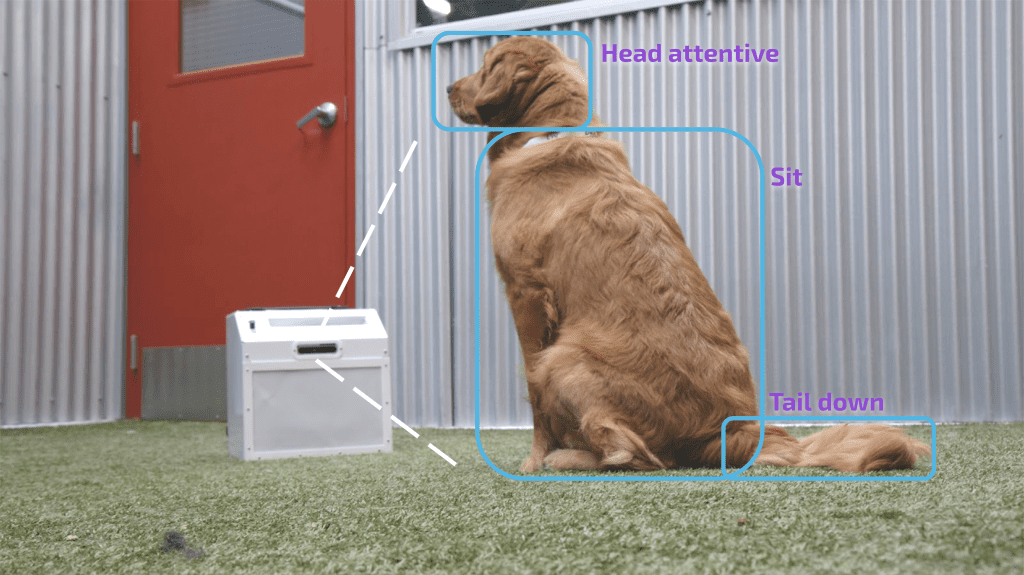
A few years ago, the SF SPCA was approached by Companion, a startup on a mission to revolutionize dog training. Their novel approach and groundbreaking technology helps dogs to learn training commands when people aren’t present. Companion’s promise is to use technology to enhance the welfare of dogs when people can’t be with them, whether it be for dogs housed in shelters, or pets who spend time alone at home when their guardian is at work. The SF SPCA is excited to announce that we have been working closely with Companion over the last two years to help them refine their technology and improve canine welfare.
Companion has developed a method of automated training that uses treat-based positive reinforcement powered by high-speed software, video analysis of dogs in real-time, and a precise treat dispenser. Here’s how it works: The system is set to work on a behavior, such as “sit”. The sensors are watching for the behavior, then immediately reward it by saying “yes” and dispensing a treat. Over time, the system introduces a verbal command and reinforces the dog for higher levels of proficiency. Throughout their testing journey, Companion has been able to teach our shelter dogs basic obedience behaviors like sit, down, stay, and recall, to high levels of responsiveness. This foundational training forms the basis for a trusting relationship between a dog and their guardian. Dogs who know these behaviors are able to have a better relationship with their adopter and are more likely to stay in their adoptive homes. A significant portion of dogs returned to shelters are for behavioral issues – this technology could change our industry’s ability to address that problem.
The ability of Companion to engage and train a dog independently also caught the attention of the SF SPCA’s veterinary behaviorists. One of the most common reasons dogs get referred to our clinic is separation anxiety, a distressing condition in which a dog becomes overly anxious when left alone, and can exhibit excessive vocalization or destructive behaviors. It affects millions of dogs in the United States. The current behavioral treatment approach for separation anxiety requires a lot of work from dog owners, often resulting in low levels of compliance. Current pharmacological solutions have downsides, and technological solutions like treat dispensers still require a person to monitor the dog’s behavior, which is very time consuming for dog guardians.
For these reasons Dr. Jeannine Berger, DVM, DACVB, DACAW, CAWA, and Dr. Sophie Liu, DVM, part of the SF SPCA’s Behavior Services Team, teamed up with Companion to test the ability of Companion’s automated training to treat separation anxiety in a dog who was resistant to behavioral and pharmacological treatments. The case study is currently under review for publication in a scientific journal and the team is looking forward to sharing their results with the public. By planning to continue to research separation anxiety, Companion and the SF SPCA are leading the way to discover and refine innovative treatments for one of the most common sources of distress in dogs and all too often, the cause of rupture in the human-animal bond.
Beyond tackling the treatment of separation anxiety, the SF SPCA is looking forward to leading the way in using Companion technology to improve the welfare of shelter dogs, by installing CompanionPro devices in our facilities starting this spring. While dogs at the SF SPCA are lucky to benefit from the expertise of a large team of credentialed behavior professionals and the attention of a strong community of volunteers, most shelters don’t have the financial or community resources to ensure that each animal in their care will get individual attention each day. Positive reinforcement is a crucial part of building the human-animal bond, and Companion technology will allow shelters to leverage the time that animals spend alone to reduce stress and teach dogs the behaviors that may help them to get adopted faster and stay in loving homes forever. Companion’s commitment to always operate on a not-for-profit basis for shelters is the promise of accessibility to the best practices in dog training and enrichment for all organizations.
To learn more, visit https://joincompanion.com/
